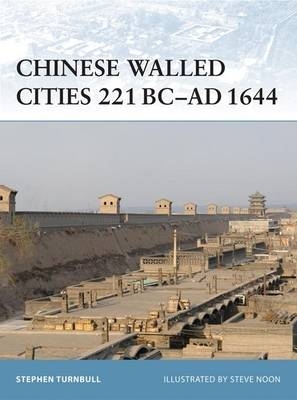
Chinese Walled Cities 221 BC– AD 1644
Seiten
2009
Osprey Publishing (Verlag)
978-1-84603-381-0 (ISBN)
Osprey Publishing (Verlag)
978-1-84603-381-0 (ISBN)
It has been said in China that a city without a wall would be as inconceivable as a house without a roof. This book traces the evolution of the walled city from the 3,000 year old remains of the beaten earth walls of the Shang dynasty to the huge stone fortifications of the Ming dynasty.
It has been said in China that a city without a wall would be as inconceivable as a house without a roof. Even the smallest village invariably had some form of defensive wall, while the Great Wall of China was an attempt to build a barrier along the most vulnerable border of the entire country. Yet the finest examples of walled communities were China's walled cities, whose defensive architecture surpassed anything along the Great Wall. This book traces the evolution of the walled city from the 3,000 year old remains of the beaten earth walls of the Shang dynasty to the huge stone fortifications of the Ming dynasty. Stephen Turnbull, expert military historian, reveals the defensive structures from all the major ancient Chinese cities, and discusses how they protected entire communities, and not just castle dwellers, with colour artwork reconstructions, maps and archive photographs.
It has been said in China that a city without a wall would be as inconceivable as a house without a roof. Even the smallest village invariably had some form of defensive wall, while the Great Wall of China was an attempt to build a barrier along the most vulnerable border of the entire country. Yet the finest examples of walled communities were China's walled cities, whose defensive architecture surpassed anything along the Great Wall. This book traces the evolution of the walled city from the 3,000 year old remains of the beaten earth walls of the Shang dynasty to the huge stone fortifications of the Ming dynasty. Stephen Turnbull, expert military historian, reveals the defensive structures from all the major ancient Chinese cities, and discusses how they protected entire communities, and not just castle dwellers, with colour artwork reconstructions, maps and archive photographs.
Stephen Turnbull took his first degree at Cambridge University, and received a PhD from Leeds University. He has travelled extensively in Europe and the Far East and also runs a well-used picture library. He currently divides his time between lecturing in Japanese Religion at the University of Leeds and writing. Steve Noon was born in Kent, UK, and attended art college in Cornwall. He has had a life-long passion for illustration, and since 1985 has worked as a professional artist. Steve has provided award-winning illustrations for the publishers Dorling Kindersley, where his interest in historical illustration began.
| Erscheint lt. Verlag | 10.5.2009 |
|---|---|
| Reihe/Serie | Fortress |
| Illustrationen | Steve Noon |
| Zusatzinfo | 5 b/w; 52 col |
| Sprache | englisch |
| Maße | 184 x 248 mm |
| Gewicht | 210 g |
| Themenwelt | Geisteswissenschaften ► Geschichte ► Regional- / Ländergeschichte |
| Geschichte ► Teilgebiete der Geschichte ► Militärgeschichte | |
| Sozialwissenschaften ► Politik / Verwaltung | |
| Technik ► Architektur | |
| ISBN-10 | 1-84603-381-0 / 1846033810 |
| ISBN-13 | 978-1-84603-381-0 / 9781846033810 |
| Zustand | Neuware |
| Haben Sie eine Frage zum Produkt? |
Mehr entdecken
aus dem Bereich
aus dem Bereich
neueste Manipulationstechniken als Waffengattung der NATO
Buch | Softcover (2023)
Westend (Verlag)
CHF 33,55
Deutschlands Schwäche in der Zeitenwende
Buch | Softcover (2023)
C.H.Beck (Verlag)
CHF 25,20


